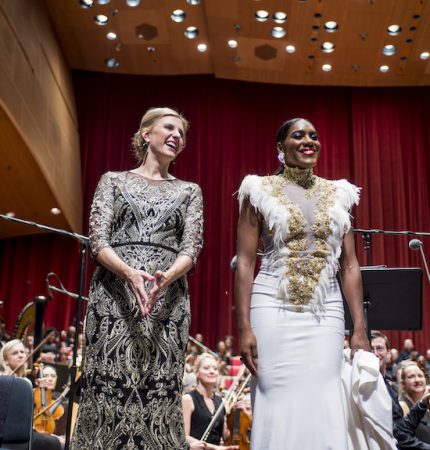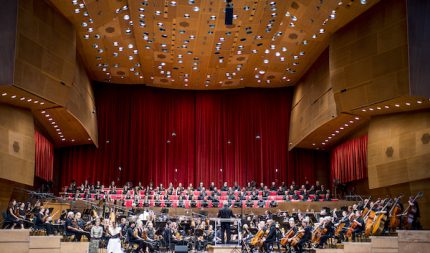Grant Park Music Festival wraps season with heavenly Mahler

Over a century after his death, Gustav Mahler still personifies for many the archetype of a haunted composer, working out his neuroses and obsessions in vast extraordinary musical works that tend to emphasize the darker and depressive side of human existence.
Yet that’s only part of the story. For all of the deep shadows in his music, Mahler’s works invariably end on an optimistic note, with only the Sixth Symphony breaking down in complete despair and desolation. His metaphorical symphonies are complex journeys from darkness to light, with just as many pages of joy and life-affirming exuberance—even if one has to traverse miles of bleak terrain to get there.
That applies especially to his Symphony No. 2 (“Resurrection”), which was performed by the Grant Park Orchestra led by Carlos Kalmar Friday night on the final program of the summer lakefront festival. The concert drew thousands to Millennium Park, which was filled to capacity.
Born of Jewish lineage, Mahler was a convert to Roman Catholicism, and his religious outlook was complicated to say the least, an ambivalence often reflected in his music.
Like Beethoven, Mahler’s spirituality was social and philosophical more than doctrinal. Even so, Kalmar’s statement in his preconcert comments—that it is “absolutely wrong” to think of Mahler’s Second Symphony as a religious work is a vast oversimplification. Mahler’s oeuvre is imbued with Christian texts, symbolism and motifs—including his own texts for the “Resurrection” symphony—as well as his Eighth Symphony. Mahler’s personal religious orientation may remain a mystery, but to deny the Christian influences that do exist in his music is to deny a significant element of his art.
Yet the power of Mahler’s music is so immediate and communicative that works like the Second Symphony can engage believers and skeptics alike. Such was surely the case with Friday night’s dedicated performance, which may not have been a “Resurrection” for the ages but proved a highly dramatic and compelling account, getting most of the important things right.
Scored for huge forces and spanning 80 minutes, the Second is a challenge for even the finest Mahler conductors to hold together.
As he has shown in previous Mahler outings—especially a memorable 2011 Das Lied von der Erde—Kalmar proved a sure and steady hand in this work, avoiding the overheated bombast that many lesser hands indulge in. He charted the dark-hued opening movement with quickish tempos while maintaining tension—opening up into the lyrical theme with a heart-easing warmth from the strings, especially affecting in the tender reprises.
Others have found more piquant charm in the Andante, but this pastoral idyll provided the right lilting respite from the surrounding darkness; Kalmar somehow managed to make the strings’ final two pizzicato chords register on the edge of audibility. The ensuing scherzo was especially fine, the musicians in synch with the sardonic bustle, bringing out the antic swagger as surely as the echt-Viennese schmaltz.
The performance came into its own in the epic finale, Kalmar negotiating the sprawling movement with great skill.
The festival skimped on the large brass forces called for, necessitating repeated exits and re-entrances for the orchestra’s horns and trumpets as they doubled the offstage Day of Judgement calls. Even with the aerobic busyness, the brass players brought gleaming strength and sonic impact to the final pages.
The evening’s two soloists, both Ryan Opera Center alums, contributed apt gleam and expressive poise to their brief spotlighted moments. J’Nai Bridges displayed a rich sable mezzo in the song “Urlicht,” a rather wide vibrato apart. Bridges and soprano Amanda Majeski soared in the final movement as the music grows in growing confidence of life after death.
Under Christopher Bell, the Grant Park Chorus has had an exceptional summer even by their usual high standards. If the chorus’s initial entrance in the finale wasn’t ideally hushed (as amplified), the singers brought polished ensemble and clarion vocalism to the triumphant coda—making a thrilling close to the performance as well as another superb summer of music-making on Chicago’s lakefront.
The program will be repeated 7:30 p.m. Saturday at the Pritzker Pavilion. gpmf.org

Posted in Performances





Posted Aug 17, 2019 at 12:42 pm by John Abbott
Many thanks for this. I remember well Pierre Boulez leading the CSO in the Second some sixteen-seventeen years ago at Symphony Center — one of the most powerful concert experiences of my life.
I thought Kalmar’s traversal, even with all the ambient distractions (the usual helicopters and sirens), even better. I turned to both the Sun-Times and Tribune today to see whether they would bother reviewing this wondrous performance. So far it seems to have fallen under their patchy radar — a sad reflection of journalism and music appreciation these days.
Posted Aug 17, 2019 at 9:37 pm by Patricia Johnson
What a beautiful finale to the Grant Park Music Festival season!!! Bravo!!!
Posted Aug 19, 2019 at 12:55 pm by Brian McCarty
I second the plaudits from Lawrence Johnson, and the comment from John Abbott (above).
I attended two of the rehearsals earlier in the week, interested in how Maestro Kalmar would navigate this symphony especially with the quiet sections likely to get overwhelmed by ambient noise downtown. He had some clever tempos that seemed to do the job and hold the audience attention.
Mezzo-soprano J’Nai Bridges in particular gave a stunning performance.
As for the missing-in-action Tribune. Their coverage of the classical music in the city is now being done by Howard Reich, who seems to cover Jazz, Rock, and other venues as well. John von Rhein retired and apparently won’t be replaced with anyone competent. Sad.
Posted Aug 19, 2019 at 1:23 pm by Lawrence A. Johnson
Tribune review ran in today’s paper.